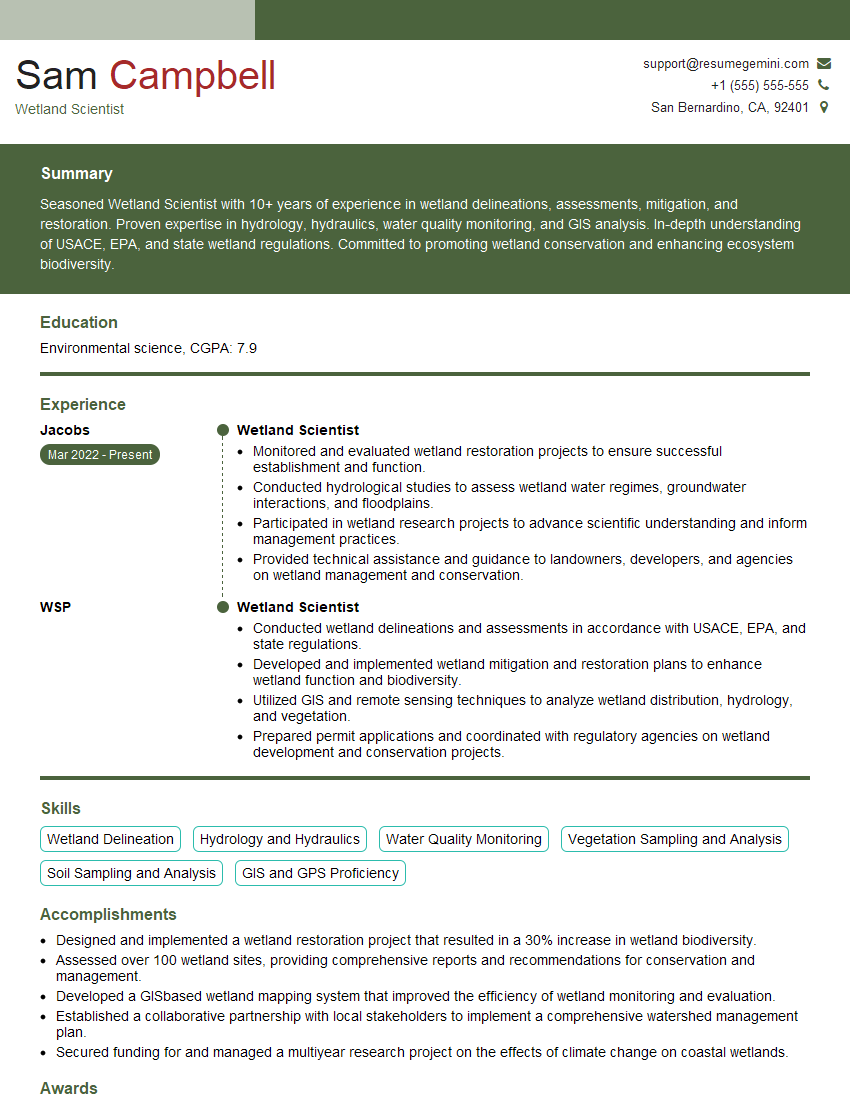Are you a seasoned Wetland Scientist seeking a new career path? Discover our professionally built Wetland Scientist Resume Template. This time-saving tool provides a solid foundation for your job search. Simply click “Edit Resume” to customize it with your unique experiences and achievements. Customize fonts and colors to match your personal style and increase your chances of landing your dream job. Explore more Resume Templates for additional options.

Sam Campbell
Wetland Scientist
Summary
Seasoned Wetland Scientist with 10+ years of experience in wetland delineations, assessments, mitigation, and restoration. Proven expertise in hydrology, hydraulics, water quality monitoring, and GIS analysis. In-depth understanding of USACE, EPA, and state wetland regulations. Committed to promoting wetland conservation and enhancing ecosystem biodiversity.
Education
Environmental science
February 2018
Skills
- Wetland Delineation
- Hydrology and Hydraulics
- Water Quality Monitoring
- Vegetation Sampling and Analysis
- Soil Sampling and Analysis
- GIS and GPS Proficiency
Work Experience
Wetland Scientist
- Monitored and evaluated wetland restoration projects to ensure successful establishment and function.
- Conducted hydrological studies to assess wetland water regimes, groundwater interactions, and floodplains.
- Participated in wetland research projects to advance scientific understanding and inform management practices.
- Provided technical assistance and guidance to landowners, developers, and agencies on wetland management and conservation.
Wetland Scientist
- Conducted wetland delineations and assessments in accordance with USACE, EPA, and state regulations.
- Developed and implemented wetland mitigation and restoration plans to enhance wetland function and biodiversity.
- Utilized GIS and remote sensing techniques to analyze wetland distribution, hydrology, and vegetation.
- Prepared permit applications and coordinated with regulatory agencies on wetland development and conservation projects.
Accomplishments
- Designed and implemented a wetland restoration project that resulted in a 30% increase in wetland biodiversity.
- Assessed over 100 wetland sites, providing comprehensive reports and recommendations for conservation and management.
- Developed a GISbased wetland mapping system that improved the efficiency of wetland monitoring and evaluation.
- Established a collaborative partnership with local stakeholders to implement a comprehensive watershed management plan.
- Secured funding for and managed a multiyear research project on the effects of climate change on coastal wetlands.
Awards
- Received the Wetland Science Award for outstanding research on wetland restoration techniques.
- Recognized with the National Wetland Conservation Award for exemplary contributions to wetland conservation.
- Awarded the Wetland Scientist of the Year honor for innovative work in wetland management.
- Honored with the Environmental Impact Award for spearheading a public awareness campaign on wetland protection.
Certificates
- Professional Wetland Scientist (PWS)
- Certified Wetland Delineator (CWD)
- Certified Soil Scientist (SSS)
- Certified Professional in Erosion and Sediment Control (CPESC)
Career Expert Tips:
- Select the ideal resume template to showcase your professional experience effectively.
- Master the art of resume writing to highlight your unique qualifications and achievements.
- Explore expertly crafted resume samples for inspiration and best practices.
- Build your best resume for free this new year with ResumeGemini. Enjoy exclusive discounts on ATS optimized resume templates.
How To Write Resume For Wetland Scientist
- Quantify your accomplishments using specific metrics and results.
- Highlight your understanding of the latest wetland science and regulations.
- Showcase your technical skills in GIS, remote sensing, and data analysis.
- Tailor your resume to each job application, emphasizing the specific skills and experience relevant to the position.
Essential Experience Highlights for a Strong Wetland Scientist Resume
- Conduct wetland delineations and assessments to identify and characterize wetlands.
- Develop and implement wetland mitigation and restoration plans to offset unavoidable impacts.
- Utilize GIS and remote sensing techniques to analyze wetland distribution, hydrology, and vegetation.
- Prepare permit applications and coordinate with regulatory agencies on wetland development and conservation projects.
- Monitor and evaluate wetland restoration projects to ensure successful establishment and function.
- Conduct hydrological studies to assess wetland water regimes, groundwater interactions, and floodplains.
Frequently Asked Questions (FAQ’s) For Wetland Scientist
What is the role of a Wetland Scientist?
Wetland Scientists play a crucial role in protecting and managing wetlands, which are vital ecosystems that provide numerous ecological and hydrological benefits. They conduct scientific studies, assessments, and monitoring to understand wetland functions, delineate wetland boundaries, and develop strategies for wetland conservation and restoration.
What are the educational requirements to become a Wetland Scientist?
Typically, a Bachelor’s or Master’s degree in Environmental Science, Ecology, Biology, or a related field is required to become a Wetland Scientist. Coursework in wetland science, hydrology, soil science, and GIS is often necessary.
What are the career prospects for Wetland Scientists?
Wetland Scientists are in high demand due to increasing environmental regulations and the growing recognition of the importance of wetlands. Career opportunities exist in government agencies, consulting firms, non-profit organizations, and research institutions.
What are the key skills and qualities of a successful Wetland Scientist?
Strong scientific knowledge, field sampling and data analysis skills, proficiency in GIS and remote sensing, understanding of wetland regulations, excellent communication and presentation skills, and a passion for wetland conservation are essential qualities for a successful Wetland Scientist.
What are the challenges faced by Wetland Scientists?
Wetland Scientists often work in challenging field conditions, face complex regulatory frameworks, and encounter resistance from stakeholders with competing interests. Climate change and increasing development pressures pose additional challenges to wetland conservation efforts.